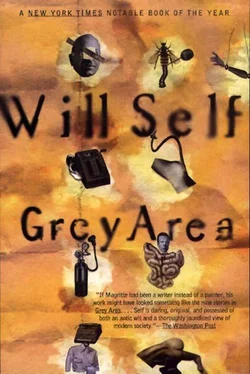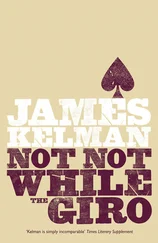But Peter didn’t trouble to analyse his emotions — it wasn’t his style. It’s difficult to imagine what the interior scape of a philosopher’s mind might be like. Modern works of analytic philosophy are so arid. How could anyone hold so many fiddly Faberge arguments in his or her mind for so long? Without the drifting motes of decaying brain cells — used-up thoughts and prototypical thoughts never to be employed — beginning to fill the atmosphere and cloud the clarity of introspection with intellectual plaster dust.
To get around the problem, Peter’s mind was akilter to real time. Like a gyroscope spinning slowly, set inside another gyroscope spinning faster, Peter’s mind went on churning through chains, puzzles and tables of ratiocination, while the world zipped by him: a time-lapse film with a soundtrack of piping, irrelevant Pinky and Perky voices. And while not exactly fecund, the similes required to describe his mental processes were sterile rather than decaying. They were like three-dimensional word puzzles: propositions, premises, theses and antitheses, all were manipulated in free fall, coaxed into place with a definite ‘click’. It was if Peter’s will were a robotic claw that lanced into a radioactive interior in order to perform subtle manipulations.
But then the greatest paradox of all is that nothing is farther off from self-knowledge than introspection, and nothing more remote from wisdom than pure intellect.
On re-entering the house, Peter found Giselle in the kitchen. She was arranging some freesias in a jamjar full of water as he popped puffing through the narrow door.
‘You must let me help you with those — they’re awfully heavy.’
‘Oh no — no. Don’t worry. You sit down. Bung on the kettle if you like.’ He was already mounting the awkward steps.
Back upstairs he placed her cases and baskets by the big pine bedstead set beneath the largest window. He sat on the edge of the bed and lost himself for a while in the Rood Room’s gullet confines.
It really was an astonishing place, hardly like a room in a house at all, more of a grotto. There was one large diamond-mullioned window over the bed and another, much smaller, on the opposite wall, the other side of the rood screen. The light from these came in in thick shafts, given body by swirls of golden dust motes. But it was the ceiling that gave the room its organic feel. It was thrown over the top like a counterpane and tied down by each corner to a respective corner. The middle of the billowing roof was held aloft, over the dead centre of the rood screen, supported there by its petrified folds. Between these folds, studding the rippling walls, were hundreds of plaster mouldings.
Running up from the room’s corners to its apex, were seams of lozenges entwined by ivy. But this simple decoration was nothing compared to the profusion of body parts — gargoyle heads, thrusting breasts, dangling penises; as well as a.comprehensive bestiary, griffins and sphinxes, bulls rampant, lions couchant — that sprouted across the rest of the curved surfaces. The eye could not take in the whole of this decoration — there were over four hundred individual reliefs — instead it reduced them to a warty effect.
Each side of the rood screen itself was adorned with some thirteen individual painted panels. Dr Morrison may have assured English Heritage that his assistants had used authentic reformulations of the original pigments to retouch the screen, yet the result was advertisingly garish. The white and flat bodies of the Grunters lay entwined in naive tableaux of sexual abandon. They sported in distorted copses of painful viridity and dug from the excremental earth the falsely dead cadavers of their brethren, dragging them back into the one and only world.
Peter Geddes couldn’t bear to look at the rood screen for too long. When he and June had bought the house some fifteen years ago, the Rood Room had been impressive, but in grimy decay. The screen was blackened and the images faint. The stippling of explicit carvings covering the walls had been chipped and disfigured into insignificance.
Dr Morrison and his crew had only finished their restoration work that spring. Now, in the glory of midsummer, with the garden outside groaning in prefructive labour, the Rood Room had acquired a pregnant burnish. The walls bellied pink, the screen glared. Even Peter was susceptible to the rioting colour and the strange sensation of heretical worship resonating down the ages. He wondered, idly, if the room might have an adverse psychological effect on his new research student.
This reverie was cut into by the sound of the family Volvo pulling up outside, and shortly after, the shouts of his teenage twins resounded through the house. He came back down the cramped stairway and found the four of them already at tea.
Peter wasn’t fazed as the four sets of eyes swivelled towards him. He knew that in his family’s eyes he cut a somewhat embarrassing figure. Not exactly a looker: his duck-egg body defied his clothes to assume recognisable forms. On him, trousers ceased to be bifurcated, shirts stopped being assemblies of linen planes and tubes; and shoes became hopelessly adrift — merely functional stops to his roly-poly body — wedged underneath, as if to stop him from toppling over.
None of this mattered to Peter, for he was one of those men who had managed in adolescence Wilfully to disregard his physical form — for good. So, he entered the kitchen unabashed and crying, ‘Here you are, you rude mechanicals!’ He cupped the head of his daughter and drew her cheek to his lips, then did the same with his son. Giselle, whose father’s touch was nothing but wince-provoking, was struck by the fact that neither twin struggled to avoid him. Quite the reverse: they seemed to lean into his kiss.
‘Well, and how were the Masai?’ Peter went on, sitting down at the head of the table and reaching for a cup of tea. ‘Did they let you drink milk and blood? Did you learn their eighty-seven different words to express the shape of their cattle’s horns?’
‘We haven’t been with the Masai, Dad,’ said Hal, the son. ‘We haven’t even been in Africa — ‘
‘Oh, I see, not in Africa. Next you’re going to tell me that you didn’t even leave England.’
‘We did leave England,’ said Pixie, the daughter, ‘but we went north rather than south. We’ve been at a rural development project, working with the Lapps in northern Sweden — ’
‘Drinking reindeer pee. And we’ve learnt fifteen different words to express the shape of a reindeer’s antlers.’ Her brother finished the account for her.
Giselle was charmed by this demonstration of familial good humour. Cuddling, nicknames, banter, all were alien to the privet-lined precincts of her proper parents.
They ate lardy cake and drank a lot of tea. The sounds of the B road that ran through the village reached them but faintly, drowned out by the rising evening chorus of the birds.
‘Well!’ June exclaimed. ‘I can’t sit here for the rest of the day. For one thing I shan’t have room for dinner. I don’t know if you had forgotten, Peter, but Henry and Caitlin are coming this evening — ‘
‘Of course I hadn’t. I’ve got some suitably caustic Burgundy. It’s just dying to climb right out of its bottles and scour that self-satisfied man’s mind.’
‘Of course, darling. I’m going to get back to work now, or I shan’t be able to finish re-turfing that lawn before dusk.’ June rubbed her hands on her trouser legs, as if she could already feel the peat on her palms. ‘You twins can do the cooking. Christ knows, you’re better at it than I am.’
‘Oh but, Ma, we’re jet lagged,’ they chorused.
‘Nonsense. Lapland is, as we all know, due north of here.’
Читать дальше












